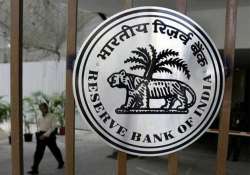Monsoon still a concern though initial fears allayed: RBI
New Delhi: While the monsoons so far have been able to diminish the fear of another year of drought, it still remains a concern for the country's growth prospect as well as its inflation outlook,

New Delhi: While the monsoons so far have been able to diminish the fear of another year of drought, it still remains a concern for the country's growth prospect as well as its inflation outlook, said the Reserve Bank of India (RBI) on Thursday.
"While the progress of monsoon has allayed initial fears (of a drought), the uncertainty surrounding its progress and distribution remains a risk to the outlook for both growth and inflation", the central bank said in its Annual Report for 2014-15.
It suggested adopting inclusive and pre-emptive food management strategies in case a weak monsoon season hits this year.
Taking into account initial conditions, including the prospects for the monsoon and for international crude prices, the RBI in April projected a baseline path for inflation in 2015-16 in which it would be pulled down from current levels by base effects till August but is expected to start rising thereafter to below 6.0 per cent by January 2016.
"So far, inflation outcomes have closely tracked these projections. The risks to this trajectory are balanced as the weather-related uncertainties are offset by falling crude prices. Inflation developments will warrant close and continuous monitoring as part of the overall disinflation strategy that requires inflation to be brought down to 5 percent by January 2017," the report said.
According to the report, the outlook for growth is improving gradually with confidence in business remaining robust.
The RBI said the government's resolve on fiscal consolidation should propel efforts to reach the target for the gross fiscal deficit for 2015-16 at 3.9 percent.
"Inflation developments will warrant close and continuous monitoring as part of the overall disinflation strategy that requires inflation to be brought down to 5 percent by January 2017."
"Plans for disinvestment need to be front-loaded to take advantage of supportive market conditions, and also to forestall cutbacks in capital expenditure to meet deficit targets," said the report.
According to the RBI, the government's resolve on fiscal consolidation should propel efforts to reach the target for the gross fiscal deficit for 2015-16 at 3.9 percent of GDP.
In the early months of the year, indirect tax collections have been robust and set to achieve budget estimates, though contingent upon a recovery in manufacturing and services.
"Furthermore, plans for disinvestment need to be front-loaded to take advantage of supportive market conditions, and also to forestall cutbacks in capital expenditure to meet deficit targets. Such cut backs compromise the quality of fiscal consolidation.
"States need to take advantage of the greater fiscal autonomy stemming from higher devolutions and prioritise capital and developmental expenditure so that the quality of sub-national fiscal correction is maintained," the report said.